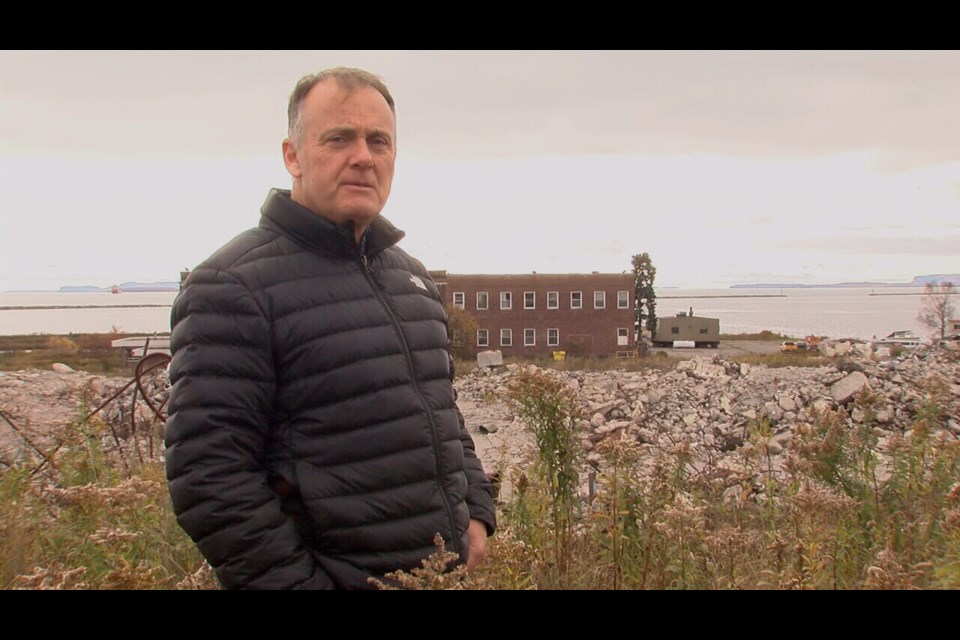THUNDER BAY — The operator of an air service and chain of fly-in fishing lodges has assumed the task of cleaning up the former Superior Fine Papers mill site.
Alan Cheeseman of Wilderness North, located on the waterfront in Current River, now owns the mill property which is located across from his base on Shipyard Road.
Starting in the early part of the last century, the mill operated for decades under various owners before production ceased in 2008.
In 2009, the Ontario Ministry of the Environment issued the first of several orders for environmental remediation.
By 2015, the mill had been demolished, however debris removal and environmental remediation remains incomplete.
Cheeseman knows challenges lie ahead in finishing the job, but he's determined to see it through.
"As the only affected next-door neighbour, watching it all happen over the last decade, we got involved primarily just because it was going to be one of the things we would have to live with forever, and probably affect our property values," Cheeseman said in an interview with tbnewswatch.com.
A ministry spokesperson said it is working with him to complete the outstanding work.
"This includes separation and appropriate removal of demolition waste from the site. There is also monitoring and assessments being undertaken to determine what needs to be done to protect the environment," the spokesperson said.
The ministry has requested groundwater monitoring and the completion of a report it will use to determine if a waste disposal site on the property is having any adverse impacts, and if further action is needed.
It's possible the disposal site could be kept open for a period of time for research and education purposes in partnership with Lakehead University.
Lakehead University researchers will participate in the project
Cheeseman has enlisted the help of Lakehead's geography and environment department in navigating the path that lies ahead.
"Whatever 'cleanup' means," he said, "we've got to find out, so we have a memorandum of understanding with Lakehead. We're partnering with them to help us through that process."
Cheeseman expects it will take over five years to finish the job.
According to a recent decision of the Environmental Review Tribunal, the previous owners of SFP decommissioned a lagoon system and removed chemicals, but "progress has stalled for some time."
Cheeseman said he expects to take the next year or so to develop his plan for the site, but he believes the environment ministry is willing to work with him to see the process completed properly.
"The problem exists. It's here. Why ignore it ? I'm probably one of the few people that could come to the table and say 'Hey, I'm impacted.' I'm willing to cooperate. I'm even willing to put some money in, but let's figure it out," he said.
Cheeseman stated that runoff from the mill site "is a big issue" for the city.
His company paid for specialized surface radar equipment to analyze the runoff pattern in that part of the city, and it confirmed that all the water drains down to the lake through the mill property and his airplane base.
"It's untreated, and the mill property goes straight out to Lake Superior ... We want to create an environment where we can say 'Let's take that stormwater and let's treat it with wetlands.' We'll set the wetlands aside for long-term purposes," Cheeseman said.
Bioremediation and other techniques will be considered
Bioremediation – where organisms are used to neutralize or remove pollutants – isn't the only option likely to be considered.
Lakehead could also use the site to develop new technologies to deal with contaminated industrial sites.
"Having access to a site like that is difficult for an educational [institution] to achieve. In our discussions with them, they had a need and we had a need, and it was a good partnership," Cheeseman said.
Robert Stewart, chair of the university's Geography and Environment department, agreed that this provides his program with a unique opportunity.
"The property provides a 'real world' example for graduate training on how to collect environmental data and develop alternative remediation concepts for these legacy contaminated sites," Stewart said.
He said the university is also glad to play a role in helping make Thunder Bay's waterfront a more inviting place for visitors and for businesses that "aren't just raw resource users."
Cheeseman said he has invested a lot in the project already.
"We know that going into it, that yeah, you can have the problem. But you don't get anything for free."
The environment ministry still holds over $1 million that was delivered by the previous owners to guarantee that a proper cleanup would be done.
That money will be given to Cheeseman once he has satisfied the ministry's requirements.
Acquiring the 180-acre site is also helping the operations of Wilderness North, however.
In addition to the float plane side of its business, the company uses specially-modified short-takeoff-and-landing wheeled aircraft that deliver fuel to remote sites.
With the acquisition of the mill property, Wilderness North planes can land very close to its hangar, using a gravel back road that was once travelled by logging trucks making deliveries to the mill.
Cheeseman said this will help the company continue to develop its fuel-delivery technology and employ people in Thunder Bay.
The company deployed its STOL aircraft last year in Indonesia, where it already had a government contract to deliver fuel to isolated communities, to provide disaster relief after the country was hit by a devastating earthquake and tsunami.
